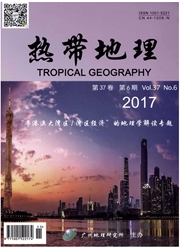

 中文摘要:
中文摘要:
宗教地理是文化地理重要的研究内容之一,但在中国相关实证研究仍不多见。结合半结构问卷调查和访谈,对广州石室圣心大教堂的非洲裔移民宗教场所地方感特征及其形成机理进行探讨。研究发现:非洲裔移民宗教场所地方依恋和地方认同发展快于地方依赖;非裔移民较强的圣地地方依恋同时存在较强的空间可替代性,但又由于区位等因素存在宗教功能之外的非可替代性;圣地地方依赖则因被宗教教义视为功利性而被掩盖。回归分析表明,社交和场所互动时间是指示地方感的最显著指标。随着非粤宗教文化的融合发展,宏观政治环境以及语言文化隔离等外生因素正对宗教地方感的提高产生重要影响。
 英文摘要:
英文摘要:
Under globalization, the geographyof religion has recently attracted much scholarly attention, and become a significant component of cultural geography. Yet, theoretical exploration and systematic empirical work on the role of sacred spaces in facilitating internal and international migrants’ assimilation and adaptation to local society are still lacking, especially in the Chinese context. With the rising global mobility, international immigrants are ubiquitous in a few large Chinese cities. In Guangzhou, an enlarging community of African immigrants is emerging. Their residential areas and daily activities, including religious activities, have shown a clear pattern of spatial concentration. Combined with semi-structured questionnaires and interviews, this study attempts to focus on this under-researched topic by exploring the underlying mechanism and the determinants of African immigrants’ sense of place in religious space in Guangzhou, using theSacred Heart Cathedral as a study area. Emperical evidence shows that African immigrants’ place attachment and place identity tended to develop before place dependence was formed. Although strong place attachment in religion space coexists with strong space substitutability, Sacred Heart Cathedral is irreplaceable to some extent because of its uniquelocation. And since the religious doctrine advocates psychological dependence rather than substance dependence, place dependence tends to be concealed unconsciously, which reveals the different nature of sense of place towards sacred space and secular space. Multivariate linear regression model reveals that social activities and the length of human-place interaction, instead of the length of residence in Guangzhou, are significant determinants for the development of African’s sense of place, because human-place interaction can foster senses of distinctiveness, continuity, self-esteem and self-efficacy. Social conditions also contribute in a significant way because social environment is an efficient element to social in
 同期刊论文项目
同期刊论文项目
 同项目期刊论文
同项目期刊论文
 期刊信息
期刊信息
